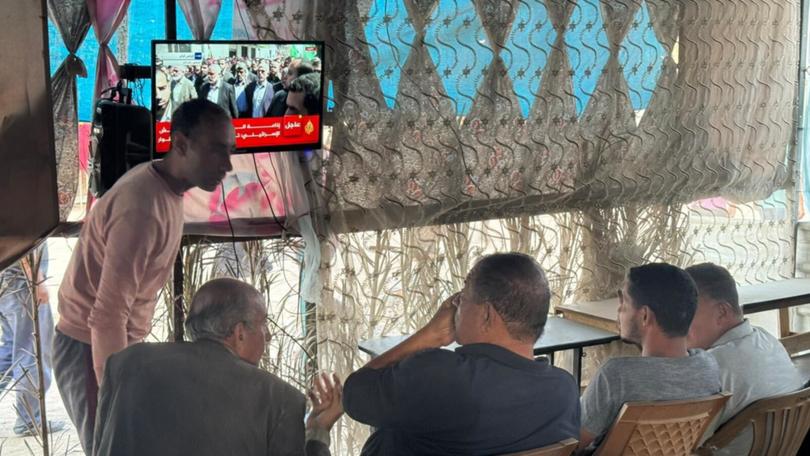Autopsy shows Hamas leader was killed by a gunshot to the head
The director of Israel’s national forensic institute has described the findings from an autopsy after the leader of terrorist group Hamas was killed.

The leader of Hamas, Yahya Sinwar, was killed by a gunshot wound to the head, according to the director of Israel’s national forensic institute, Dr. Chen Kugel, who oversaw the autopsy and described its findings in an interview with The New York Times on Friday.
He said that shrapnel, possibly from either a small missile or tank shell, had earlier hit Sinwar’s arm, causing bleeding that he was trying to staunch by using an electrical cord as an impromptu tourniquet. “But it wouldn’t have worked in any case,” Kugel said. “It wasn’t strong enough, and his forearm was smashed.”
Several points remained unclear, including who fired the shot, when and with what weapon.
Sign up to The Nightly's newsletters.
Get the first look at the digital newspaper, curated daily stories and breaking headlines delivered to your inbox.
By continuing you agree to our Terms and Privacy Policy.Hamas confirmed the killing of Sinwar in a televised eulogy Friday by his longtime deputy, Khalil al-Hayya, who said the loss had changed nothing for the armed group or its war with Israel. The remarks by al-Hayya stood in contrast to the optimism expressed a short time earlier by President Joe Biden, who said Sinwar’s death presented “an opportunity to seek a path to peace” in the yearlong war in the Gaza Strip.
“We are continuing Hamas’ path,” al-Hayya, who lives in exile in Qatar, said in the group’s first official comments about Sinwar’s killing by Israeli forces, adding that the slain leader’s “banner will not fall.”
Speaking to reporters in Berlin on Friday, Biden called Sinwar’s death “a moment of justice” and a chance at “a better future in Gaza without Hamas.” He plans to send Secretary of State Antony Blinken to Israel in the coming days to discuss securing Gaza and postwar planning, an effort to jump-start cease-fire talks that have been stalled for months.
The president spoke with Prime Minister Benjamin Netanyahu of Israel, whose office said that both leaders had agreed there was an “opportunity to advance the release of the hostages” captured in last year’s Hamas-led attacks in Israel as part of a cease-fire deal. Dozens of hostages are still being held by Hamas and its allies in Gaza.
Sinwar orchestrated the Hamas assault on Oct. 7, 2023, that killed up to 1,200 people, captured some 250 hostages and prompted an Israeli retaliation that has killed tens of thousands of Palestinians and left much of Gaza in ruin.
He was considered the driving force behind Hamas’ refusal to surrender, and his survival made it impossible for Israel to declare victory. But after Sinwar’s killing, Netanyahu made it clear that he would continue to direct the Israeli military to pursue Hamas. “This is not the end of the war in Gaza,” he said in a video address. “It is the beginning of the end.”
Here’s what else to know:
— Relief in Gaza: Many war-weary Palestinians in Gaza reacted to Sinwar’s death with relief on Thursday. Some in Khan Younis, his hometown, expressed hope that the war might soon end, while others blamed him for starting the conflict by organizing the Oct. 7, 2023, attacks on Israel.
— Unlikely find: For over a year, Israel’s security establishment, backed by the United States, dedicated vast resources to its hunt for Sinwar, who was thought to be hiding in Hamas’ tunnel network under Gaza. Ultimately, a unit of trainee squad commanders unexpectedly encountered Sinwar above ground while on an operation in southern Gaza.
— Netanyahu weighs push: Netanyahu, directing remarks Thursday toward Palestinians in Gaza, said the war could end “tomorrow,” if Hamas laid down its arms and returned the hostages. Hamas has survived the deaths of many previous leaders, and Netanyahu must still weigh a renewed push for a hostage deal against the priorities of his allies in government who want him to continue the war.
— Hamas’ next steps: Sinwar’s killing was a powerful blow to a violent organization that had already seen several senior leaders killed since the war in Gaza began. Though few experts expect Hamas to collapse, they said his elimination could cause a leadership vacuum and more chaos in its ranks. It remained unclear when Hamas would announce a successor.
— Hostage families react: For the families and supporters of the hostages remaining in Gaza, the killing of Sinwar, their chief captor, brought both a moment of satisfaction and deep trepidation over the fate of the captives.
This article originally appeared in The New York Times.
© 2024 The New York Times Company
Originally published on The New York Times
